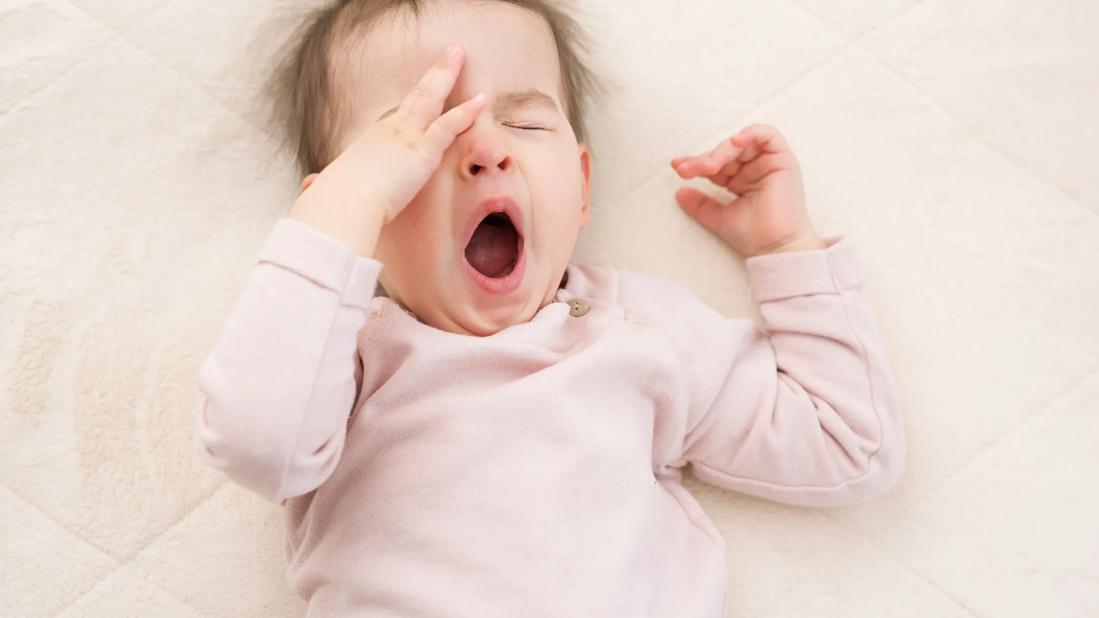Yawning is a clear signal, but frowning, ear-pulling and finger-sucking can be, too

Your baby is getting sleeeepy, verrrry sleeeepy … or are they? Sometimes, it can be hard to know. After all, they don’t have the words to tell you how they’re feeling, so it’s up to you to learn to decode their actions and expressions.
Advertisement
Cleveland Clinic is a non-profit academic medical center. Advertising on our site helps support our mission. We do not endorse non-Cleveland Clinic products or services. Policy
“Sometimes, parents get frustrated when their baby seems to be crying for food but refuses to eat,” says pediatrician Maureen Ahmann, DO. “That can be a sign that the baby is actually tired, not hungry.”
Dr. Ahmann walks us through some common signs of tiredness in babies.
By paying attention to your baby’s facial expressions, body language and sounds, you can learn to recognize when they’re getting sleepy — and put them to bed when they’re starting to get tired, rather than when they’re overly tired.
As with older kids and adults, signs of sleepiness are often evident on your baby’s face. Look for:
Certain types of body language can indicate sleepiness, too, like if your baby is:
Here are some other signs that your baby is ready to hit the hay:
Advertisement
Signs of sleepiness can quickly progress into overtiredness, and from there, it can be difficult to get your baby to go down. Sure, that can seem counterintuitive. After all, shouldn’t a sleepy baby want to, well, sleep?! But when they’re too tired, they experience a rush of the hormones cortisol and adrenaline that can amp them up instead of calming them down.
“To keep your baby from becoming overtired, put them down for a nap as soon as you notice signs of drowsiness, like eye rubbing and droopy eyelids,” Dr. Ahmann advises.
Every baby is different, so your child may not exhibit all the signs or all the same signs. Even if your first child did some of them, your second or third or fourth child may be completely different.
It’s also possible that, in the hustle and bustle of everyday life, you won’t always notice the signs. One minute everything seems fine, and the next, your baby is wailing and clearly overtired — though, you hadn’t noticed that they were even a little tired.
Dr. Ahmann recommends paying attention to your baby’s wake windows, or the times they’re awake between naps. What are their usual patterns? What times do they typically nap and for how long? You can even use an app to keep track of them, if you find it helpful.
“Keeping babies on a regular sleep-wake schedule will help them be better at falling asleep, staying asleep and not becoming overtired,” Dr. Ahmann notes.
She shares recommendations for how much sleep your baby needs based on their age:
These are general frames of reference. But remember: Just like grown-ups, each baby has their own habits, preferences and needs.
“There’s a range of ‘normal’ sleep habits, and all babies are different,” Dr. Ahmann clarifies. “If you have concerns about your baby’s sleep habits, it’s always best to talk them through with your pediatrician.”
Advertisement
Learn more about our editorial process.
Advertisement

Your child may be ready if they’ve outgrown their crib or keep escaping it, or if they seem mature enough to make the switch

Babies can be noisy little sleepers! Blame small nasal passages and short sleep stages

Experts recommend having infants sleep in your bedroom but not in your bed

This sleep training method can bring quick results, but it may be stressful for parents

Help children get their needed rest by teaching good sleep hygiene, using mindfulness techniques and creating a calming environment

This technique involves picking up your baby to soothe them if they fuss or cry, but then, returning them to their crib before they fall asleep

Also known as graduated extinction, ‘Ferberizing’ teaches your child to self-soothe and fall asleep on their own

This technique can initially take a lot of time and patience, but it can also comfort your child as they learn to fall asleep on their own

Wearing a scarf, adjusting your outdoor activities and following your asthma treatment plan can help limit breathing problems

Your diet in the weeks, days and hours ahead of your race can power you to the finish line

When someone guilt trips you, they’re using emotionally manipulative behavior to try to get you to act a certain way